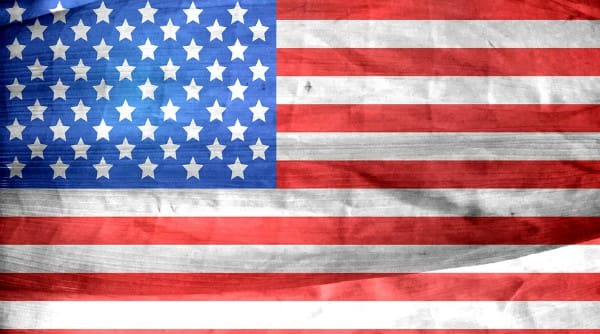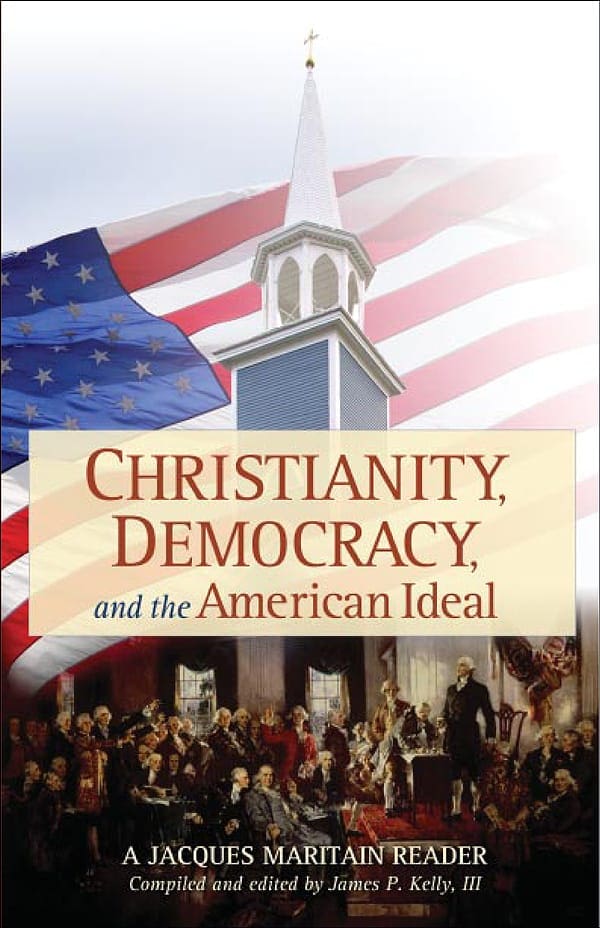There is no complete distinction between matters of governance and matters of faith, especially in America, where legislatures write laws and courts decide cases that bear on human life, health, marriage, the family, and education. Maritain held freedom of conscience to be a sacred right through which a person directs his life toward God. The state, although rightfully concerned with promoting a democratic charter expressing the virtues of the common good, should never compel citizens to ignore the dictates of their consciences in reaching such a consensus. In a democracy, diverse philosophical or religious schools of thought should freely compete in the construction of the democratic charter.
The Lord Christ said, “Render therefore to Caesar the things that are Caesar’s: and to God, the things that are God’s.” He thereby distinguished the two powers and, in so doing, emancipated the souls of men. Any sort of temporal work — not only a public decree or legislative enactment, the raising of taxes, the declaration of war or a treaty of peace, but also the activity of a professional or syndical or political group, the exercise of some particular civic right — may come into special connection with the good of souls, once it becomes, for instance, the occasion of some spiritual aberration or happens to affect sufficiently seriously the rights and liberty of the Church or the orientation of the faithful toward eternal salvation.
Who is to be the judge of such a connection and of the gravity of the spiritual interests involved? Clearly the Church alone.
As a Catholic and by my Catholic Faith, I am bound in conscience to no human, theological, or philosophical opinion, however well founded it may be, and still less to any judgments on contingent or worldly matters, or to any temporal power.
Nor am I bound to any particular form of culture or civilization, and still less of race or blood. I am bound uniquely to what is universality itself and super-universality: to the Divine, to the words and precepts of Him who said, “I am the Truth, I who speak to you.”
The secret of the heart and the free acts thereof, the universe of moral laws, the right of conscience to hearken unto God, and to make its way to Him— all these things, in the natural as in the supernatural order, cannot be tampered with by the state nor fall into its clutches. Doubtless, law binds in conscience, yet this is because it is law only if just and promulgated by legitimate authority, not because the majority or the state can be the standard of conscience.
The body politic has the right and the duty to promote among its citizens, mainly through education, the human and temporal — and essentially practical — creed on which depend national communion and civil peace. It has no right, as a merely temporal or secular body, enclosed in the sphere where the modern state enjoys its autonomous authority, to impose on the citizens or to demand from them a rule of faith or a conformism of reason, a philosophical or religious creed that would present itself as the only possible justification of the practical charter through which the people’s common secular faith expresses itself.
As a result, it is but normal that in a democratic culture and society, the diverse philosophical and religious schools of thought which, in their practical conclusions, agree with regard to democratic tenets, and which claim to justify them, come into free competition. Let each school freely and fully assert its belief! But let no one try to impose it by force upon the others! The mutual tension that ensues will enrich rather than harm the common task.
There is no belief except in what is held to be intrinsically established in truth, nor any assent of the intellect without a theoretical foundation and justification. Thus, if the state and the educational system are to perform their duty and inculcate the democratic charter in a really efficacious way, they cannot help resorting — so that minds will be put in possession of such a foundation and justification, and perceive as true what is taught them — to the philosophical or religious traditions and schools of thought that are spontaneously at work in the consciousness of the nation and which have contributed historically to its formation.
Adherence to one of these schools of thought or another rests with the freedom of each person. But it would be sheer illusion to think that the democratic charter could be efficiently taught if it were separated from the roots that give it consistence and vigor in the mind of each one, and if it were reduced to a mere series of abstract formulas — bookish, bloodless, and cut off from life.
On the one hand, the state — or the groups and agencies in the body politic that are concerned with education, or the authorities that govern the educational system — should see to it that the democratic charter be taught (in a comprehensive, far-reaching, and vitally convincing manner) in all the schools and educational institutions. On the other hand, and for the very sake of fostering the democratic faith in people’s minds, the educational system should admit within itself pluralistic patterns enabling teachers to put their entire conviction and most personal inspiration in their teaching of the democratic charter.
The pluralism I am advocating for public schools should relate, in my opinion, not to the curriculum, but to the various inspirations with which the common curriculum would be taught if the members of the teaching body were distributed and grouped according to their own wishes, as well as to the moral geography of local communities and the requests of associations of parents. In this way, their own personal or philosophical convictions would roughly correspond to those that prevail in the social environment.
The most rational solution, in tune with the pluralistic principle, would consist of having the teaching of the democratic charter given not by one, but by several teachers belonging to the main religious or philosophical traditions represented in the student population of a given school or college, each one of those teachers addressing the students of his own spiritual tradition. Yet as logical as it may be, such a solution has little chance, I am afraid, to appear feasible to our contemporaries. Something else should be carried into effect, in every country, to ensure a real and efficient teaching of the democratic charter in public schools.
If a new civilization is to be inspired by Christianity, if the body politic is to be quickened by the leaven of the gospel, it will be because Christians will have been able, as free men speaking to free men, to revive in the people the often unconscious Christian feelings and moral structures embodied in the history of nations born out of old Christendom, and to persuade the people, or the majority of the people, of the truth of Christian faith, or at least of the validity of Christian social and political philosophy.
I would say, therefore, that in the matters we are considering, civil legislation should adapt itself to the variety of moral creeds of the diverse spiritual lineages that essentially bear on the common good of the social body — not by endorsing them or approving of them, but rather by giving allowance to them.
By removing obstacles and opening the doors, the body politic and its free agencies and institutions would positively facilitate the effort of the apostles of the gospel to go to the masses and share their life, to assist the social and moral work of the nation, to provide people with leisure worthy of human dignity, and to develop within them the sense of liberty and fraternity.
Such would be, as I see it, the positive cooperation between the body politic and the Church.
Church Documents
On the relations between the Church and state in western
democracies: Pope Paul VI’s Dignitatis Humanae
(Declaration on Religious Freedom, 1965).
Freedom of Thought and Religion
+
This article is adapted from a chapter in Christianity, Democracy, and the American Ideal by Jacques Maritain, which is now available from Sophia Institute Press.
Art for this Independence Day post: Cover used with permission; Featured image used with permission of Pixabay.





